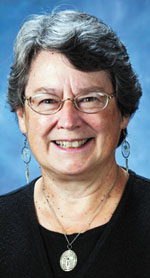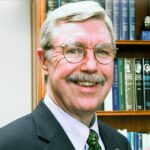By Corrine Winter
Happy New Year! This Sunday we start a new liturgical year as we celebrate the season of Advent, a season that calls us to hope even when times seem most difficult. That may be a call all of us need in a special way this year. It has been suggested that an appropriate color for the season would be midnight blue, representing the light that is not quite fully absent, the faintest promise of dawn that will come, but only after long hours of continuing darkness.

For Christians, Advent is a time when we pay particular attention to the words of the prophets who, even before the coming of Christ, insisted that the People of God should hold to the covenant promises God made, believing in God’s fidelity no matter how impossible a situation might seem. They should be grateful for God’s creation and for the saving acts of God which marked their history, and should keep the law of God, especially by attending to the needs of the poor.
What is the hope to which we are called today? As I look over some of the Advent readings, it seems to me that they point to several qualities of that theological virtue.
Hope is communal, as is the reign of God for which we hope. It is not about the conviction that all will be well for me, that my individual needs will be met, or even that I will “go to heaven.” Rather, it has to do with the destiny to which all people and, indeed, all of creation, are called — a share in the communion for which God created us, communion in the life of the Triune God.
Second, hope is not passive. It isn’t about waiting for God to do something about the sinfulness and suffering in the world. It is about acting according to God’s call even when we can’t see that it will “do any good.” It is about sharing what we have even when we are afraid it can’t be enough, and reaching out to others even if we might get hurt in the process. The reign of God is worth the cost.
Finally, hope is stirred by the Christmas scene, but also by the cross which is foreshadowed even in the readings for Christmas itself. It isn’t about avoiding suffering, although it is also not about seeking suffering for its own sake or about putting up with suffering that is the result of injustice. It is about understanding that some suffering is part of the life process. Sometimes suffering can even be chosen if it is chosen for the sake of building up the Kingdom of God by challenging sinful systems or by loving those who don’t seem to want or return our love.
Born of a human mother, growing up through the normal human process, speaking and acting in the language familiar to the people among whom he lived, suffering and dying, Christ reveals the fullness of God’s involvement in our lives. Every moment is surrounded by the Spirit of God. And therein lies our hope.
May our celebration of Advent find us pausing to hear the words of the prophets — those of the past and those of our own time. May we neither let go of our convictions about what is essential for our society and our world, nor assume that the world is doomed because others do not agree with us or act as we believe we should.
(Corinne Winter is a professor of theology at St. Ambrose University in Davenport.)











